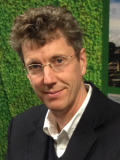Guest Blog:Voices and choices: Laudato Si at three years
Steven Stone: Chief, Resources and Markets BranchUnited Nations Environment Programme (UN Environment) this is reprinted from the Green Growth Knowledge Platform.
Somewhere back in the 12th century, a young man by the name of Francesco Bernadone heard a voice, telling him to “go and repair this house.” He set about repairing the chapel, and kicked off a movement that would revitalize the catholic church and inspire all who love nature.
Fast forward to March 2013, when Jorge Bergoglio was elected Pope – and chose the name of Francis.
It was just three years ago, on June 18, my birthday, that Pope Francis launched Laudato Si, an invitation to all for dialogue on the radical changes needed to repair our common home, the earth.
Last week, in Rome, his team from the Dicastery for Integral Human Development - led by Cardinal Turkson - convened voices from around the globe to celebrate and put into action the radical call for ecological conversion. People from all faiths coming together to share their voices and concerns.
We heard the voice of youth that told us, not to worry about saving the planet as it would be fine and here long after we ourselves killed off our own habitat; and that the real issue was the survival of our species.
We heard the voice of a poet from the Marshall Islands, who lamented the loss of her home to rising seas, the fruit of our industrial revolution and carbon-laden consumer culture; and watched with horror as she faltered, stopped speaking, and crumpled as she fainted under the weight of her words.
We heard the voice of a shaman from Greenland, who brought tears to my eyes as he spoke of the disappearing ice that held the wisdom of the ages, melting away under a changed climate, crying out as plunging water from ice sheets into a rising ocean.
Every voice called out and appealed to us: do what you can now, to put “our canoe” as one speaker from the Pacific called it, back into the right direction. Stop agonizing, and start organizing said young Allen Ottaro from Kenya. Or as a young activist from India put it so succinctly, if not us, whom? and if not now, when?
The call had a special resonance for me, as one of the speakers compared the state of our planet to that of a cancer patient facing critical and chronic malfunction of vital organs - in this case ecosystems like the West Antarctica ice shelf, or the gulf stream, that stabilize our weather systems and climate.
Like the earth, I carried my own affliction inside, the result of complications from pneumonia, and felt like a living metaphor for a sick planet that needs healing and repair - and a change of lifestyle to begin the long road to recovery.
How can we do this?
On the planetary scale, we at the conference came up with three central ideas that can take us forward, back to health and repair.
First, we need to walk the talk. The church, the UN, schools and universities, need to become carbon neutral and demonstrate that it is possible to be a both a good global citizen and a pioneer of the new economy. The UN does this through the Sustainable UN network, the catholic church does this through new initiatives like good lands.
Second, we need to put our money where our mouth is and lead by example. That means, divesting our pension funds and savings from fossil fuels and carbon loaded assets. Several participants from the financial sector showed us how something as simple as compulsory disclosure of carbon assets could go a long way to raising the bar on performance and sustainability.
Our own UN Environment Finance Initiative has moved the needle in this direction with its Portfolio Decarbonizationproject – now including over US$ 800 billion of carbon free assets.
And third, we need to engage in a dialogue that unites rather than divides, by seeking those elements that bring us together. Like the common purpose of bringing our own lifestyle choices into alignment with planetary health, sharing, and living more simply.
Or as Pope Francis put it in Laudato Si, to live wisely, think deeply, and love generously.
Every day, we are faced with simple choices that together add up and determine our collective impact on the environment and our future.
The success of the #BeatPlasticPollution campaign, launched for World Environment Day in India in June of this year, rested on the recognition that it takes only a small shift to move away from single use plastics to more durable alternatives.
And this year at the High Level Political Forum in New York, countries will report on their efforts to advance sustainable consumption and production – and notably, how new platforms like the One Planet Network can bring us together and unite our efforts.
Which is also why UN Environment has launched a new initiative to unite with communities of faith to repair our common home - #Faith4Earth. Reaching out to the literally hundreds of millions of people who find their home and strengthen their resolve to act in these communities of faith.
Because at the base of every decision, lies a choice. To consume more responsibly, to live life more lightly, and to spend more time on the things that will rebuild the resilience of our common home.
Laudato Si at three years old. Confronting us with the basic choices we all make every day, and urging us to join forces – and our voices – to repair and rebuild our common home.




Comments
Post a Comment